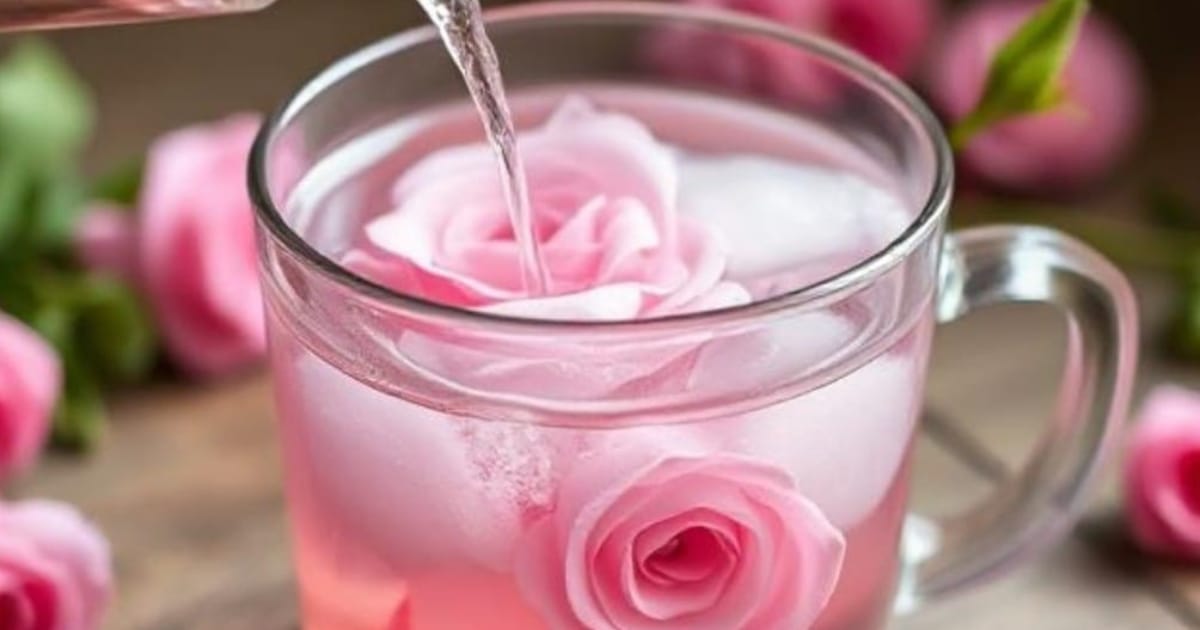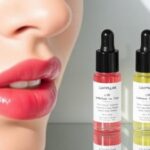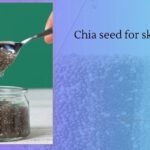Rose water is frequently used in skincare due to its soft, soothing, and moisturizing characteristics. Here are some benefits and techniques for using rose water on your face:
Benefits of Rose Water for Skin:
- Hydration: Rose water retains moisture, keeping skin moisturized and refreshed.
- Soothing: Due to its anti-inflammatory characteristics, it can relieve redness and irritation.
- Antioxidant-rich: Rose water includes antioxidants that preserve skin cells and provide a healthy shine.
- Toning: Functions as a natural toner, tightening pores and adjusting the skin’s pH.
- Refreshing: It helps to revitalize and erase dullness from the skin, making it excellent for a midday skin boost.
- To balance skin and eliminate pollutants, use rose water as a toner after cleaning. Spray or apply with a cotton pad.
- Face Mist: Mist with rose water throughout the day for an immediate refreshment.
- Makeup Setting Spray: Spray rose water on your makeup to help it set and provide a natural shine.
- Face Mask Ingredient: Rose water may be used to DIY face masks for extra hydration and calming effects.
- Under-Eye Treatment: Use rose water to minimize puffiness and soothe the skin.
- Face Mask Ingredient: Rose water may be used to DIY face masks for extra hydration and calming effects.
- Under-Eye Treatment: Use rose water to minimize puffiness and soothe the skin.
How to Choose the Right Rose Water?
Choosing Rosewater
For the greatest effects, use only pure, organic rose water with no additional scents or preservatives.
Rose water is a fragrant beverage produced by steeping or distilling rose petals in water. It has been utilized for ages in many civilizations for its distinct aroma, therapeutic benefits, and flexibility in culinary, cosmetic, and medical uses. Here’s a deeper look at what makes Rosewater unique:
How Rose Water is Made?
Things needed
- 12 rose petals.
- 2 liters of purified water.
Procedure
Rinse the rose petals with lukewarm water.
Immerse the petals in a large pot filled with adequate distilled water.
Heat the water gently in a covered pot until petals lose luster.
Strain the juice and discard the petals.
Store rose water in a glass jar.
In the traditional method, rose water is made by heating rose petals to extract their essence and collecting the vain fragrant components in a watery solution.
The Damask rose (Rosa damascena) is best suited for this purpose as it has a strong fragrance and high oil content. The resultant liquid has somewhat of a clear aspect, and it carries a moderate and fragrant rose-gold essence.
Types of Rose Water
Distilled Rose Water is an extraction method where steam distillation is used to extract the essential oils and the water-soluble components of the rose.
Infused Rose Water: Created by soaking rose petals in water to provide a softer rose aroma and flavor. Frequently less concentrated than distilled rose water.
More pure than usual rose waters, its mildest fragrance variant is rose hydrosol, which is commonly prepared as a byproduct during essential oil distillation.
Benefits Of Rose Water For Skin And Face

The calming, moisturizing, and balancing properties of rose water are mainly accepted in skincare. Here are some key benefits of rose water for the skin and the face:
Hydrates and moisturizes
This is because rose water acts as an excellent natural humectant that draws in, retains moisture, and prevents loss of any kind. Spraying or toning with rose-water might give an immediate sensation of hydration that leaves the skin smooth and revitalized without blocking the pores.
Balances skin pH levels
Though the pH of the skin is slightly acidic, between 4.5 and 5.5, pollution and aggressive skincare procedures are known to disturb this balance. Rose water reestablishes the natural pH of the skin, making it a mild yet effective toner especially for sensitive or acne-oily skin types.
Soothes skin irritation and reduces redness
Thanks to the anti-inflammatory properties of rose water, it helps reduce inflammation in the first place and thereby renders its treatment suitable for conditions such as rosacea, eczema, or sunburn. Thus, rose water may well minimize redness and irritation while leaving a lovely cooling sensation-the perfect remedy for sensitive skin woes.
Rich subject of antioxidants
Rose water is rich in vitamins A, C, and E, thus providing antioxidant effects by scavenging free radicals responsible for the signs of aging-wrinkles and dullness. These antioxidants boost the recovery of the skin as well as quality of skin cells, ultimately resulting in a younger look.
Controls excessive oil and prevents acne
Rose water controls excess oil production, thus reducing shine and preventing clogged pores that lead to acne formation. The antibacterial properties also work to reduce acne by killing acne-causing bacteria without drying the skin.
Helps reduce puffiness and dark circles

Cool rose water has cooling and anti-inflammatory properties that help soothe puffiness of the eyes. It comes in handy in diminishing dark circles also, as good blood circulation is promoted in this delicate area when rose water is applied with the help of cotton pads or used as a compress.
Tighten pores; refresh skin.
Rose water tightens pores; providing a smooth-touched and toned appearance that enhances the overall texture of the skin. An ideal toner, rosewater refreshes the skin without depleting its moisture, leaving the skin soft and glowing instead.
Natural Makeup Setting Spray.
Rose Water is also a natural makeup-setting spray that brings a dewy finish to the makeup while being long-lasting without drying the skin. It helps create a delicate, moisturized finish for the makeup looks.
Use your rose water for the skin and face by:
It is quite easy to prepare rose water at home, and thereby its purity will be regulated. Here is a simple way to make rose water, using either fresh or dried rose petals.
Method: Distilled Rose Water (Steam Method)
This method yields purer and more concentrated rose water, which is comparable to the one available in stores.
Ingredients:
- 1 cup of fresh petals (about 2-3 roses) or ½ cup of dried rose petals (use organic pesticide-free roses).
- 1 cup distilled water.
- Ice cubes.
- Large saucepan with a lid.
- A heat-safe bowl or small ceramic dish.
- A small glass jar in which to store the rose water.
Place a small ceramic plate or heat-safe bowl in the center bottom of the large saucepan. Add rose petals and pour distilled water over them.
Place the lid on its back to make the condensation dribble into the bowl. Heat on low and watch for the steam to rise, condense, and drop into the bowl. For about 20-30 minutes, continue cooking and adding ice to the top of the lid, until enough rose water has collected. Let me cool, and store in a glass jar or sterilized spray bottle- uses within a 2-week window.
Rose water is a soothing, entirely natural product that can be irritating to some skin types or cause allergic reactions. Symptoms may be redness, irritation, rashes, or a prickling or burning sensation.
To avoid these reactions, it is advisable to carry out a patch test whereby one must place a small amount of rose water on the skin and wait 24 hours to assess for any irritation.
Rose water, that most widespread ingredient in skin care, can cause eye discomfort, photosensitive reactions, and circumstances to aroma sensitization.
If burning, redness, and watering occur, rinse immediately with cold water and discontinue use. Besides, rose water can sensitize your skin for sunlight, so it is imperative to apply sunscreen before stepping out.
For people sensitive to powerful scents, the natural aroma of rose water could cause discomfort.
Using Rose Water for Skin and Face

Rosewater is a versatile and effective skin treatment that can be used for purposes including facial toner, moisturizing mist, makeup setting spray, or puffy-eyed remedy.
Because it balances your skin’s pH and shrinks your pores, rose water serves as an excellent supplement to your skincare routine. You may apply it on a cotton pad or mist it on your face for an instant fresh effect.
Generally, it can reduce puffiness and revive tired eyes and, over time, lessen dark circles. Therefore, rose water is a versatile and effective skincare agent.
Rosewater is an all-natural product that can be used in other cosmetological techniques like facial masks, toners, blemish treatments, after-sun lotions, and in the treatment for the dry skin of the body.
The antimicrobial and anti-inflammatory properties of the plant will heal the acne and prevent recurrence. Moreover, it serves as a soothing agent against reddening and irritation. Additionally, it can be used with facial oils to boost hydrating properties.
Tips for Using Rose Water on Skin and Face
Use pure rose water: Select freshly extracted from the purest rose, without chemical enhancements.
Storage: Store your rose water either in dark and cool conditions or refrigerate it.
Patch test first: If you have sensitive skin, perform a patch test on your wrist before applying on the face.
Allow your skin to experience hydration, calming properties, and invigoration with rose water in your skincare routine for healthy, glowing skin.
















